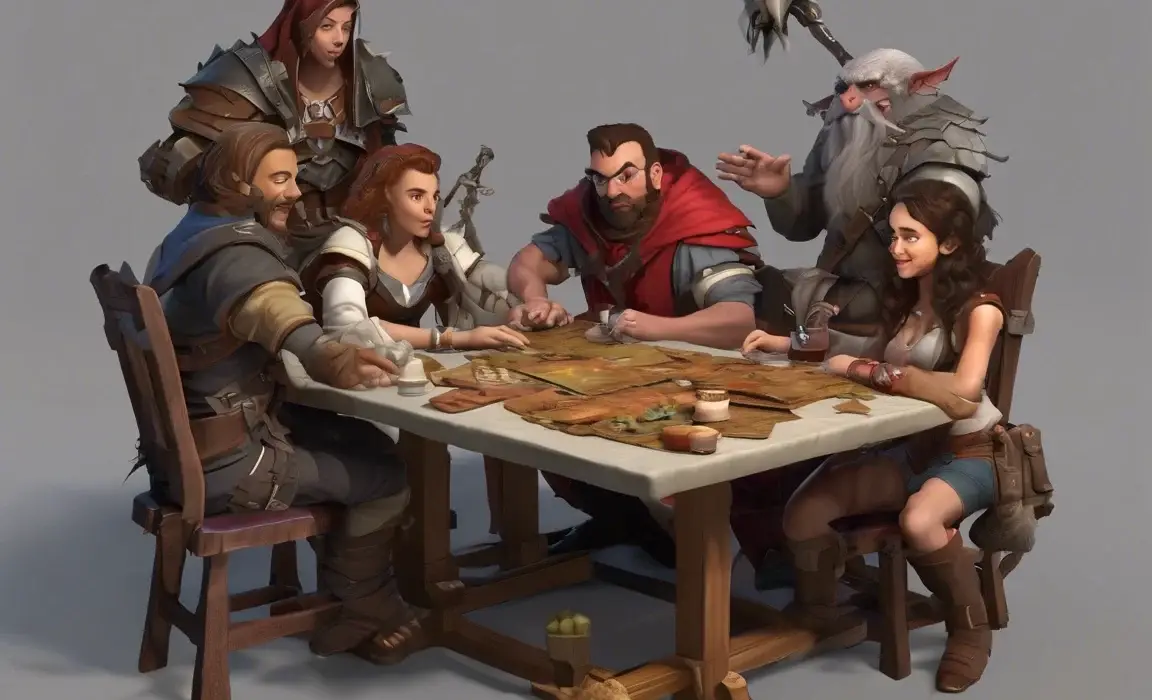You ever notice how running a D&D game is a little like being the designated driver at a party no one else wants to leave? Welcome to the club, my fellow forever DMs. I’ve been doing this since high school, herding my awkward, hormone-riddled friends through dungeons, and somehow two decades later, I’m still the one with the GM screen and the emotional support snacks. And sure, I run everything—at cons, at home, online. Sometimes I think my soul’s tied to an unbreakable contract nobody else agreed to sign except me and every Black parent at a PTA meeting. It’s just part of my DNA I guess.

You ever notice how running a D&D game is a little like being the designated driver at a party no one else wants to leave? Welcome to the club, my fellow forever DMs. I’ve been doing this since high school, herding my awkward, hormone-riddled friends through dungeons, and somehow two decades later, I’m still the one with the GM screen and the emotional support snacks. And sure, I run everything—at cons, at home, online. Sometimes I think my soul’s tied to an unbreakable contract nobody else agreed to sign except me and every Black parent at a PTA meeting. It’s just part of my DNA I guess.
But then there’s always that person, probably you, who never steps away from the DM seat. Don’t even pretend like you’ve never seen it coming: if you don’t schedule the game, no one does. The group chat lights up when you drop a day, otherwise folks vanish like rent money on payday. Suddenly, you’re not just the DM, you’re the social glue, therapist, IT support, and the one who’s gotta explain why “scheduling conflicts” are just white-collar ways to say “I don’t feel like it.” If you get burnt out, the campaign flatlines. It’s not fair. They all say they love D&D, but apparently, love don’t pay the emotional overhead.
And yo, the guilt is real. You know you should take time off for your mental health, but if you cancel, everyone’s Saturday becomes “Do laundry and pretend to read a book.” It’s like some twisted group project. Dare you hope someone else steps up? Nah, because the second you express doubt, the silence gets thick enough to cut with a player’s unused dagger. If you’re waiting for someone else to run a game, you might wait until the heat death of the universe. Hope you like purgatory.
Let’s talk about stats. If you’ve been DM for any length of time, you’ve run entire sagas, watched characters go from barely surviving goblin attacks to knocking over demon lords. Meanwhile, on the player side, you’ve maybe played your own character up to, what, level 4? 5 if you’re lucky or at Adventurers League with strangers who name their tieflings after TikTok trends. You got all these stories you gave to others, but when it’s your turn to swashbuckle, suddenly you realize you’ve played the same “support caster” three times because it’s easier to manage than remembering your own birthday.
And let’s be real: even when you get to play, you can’t turn off the DM brain. You spot every plot twist before it drops. “Oh, look, a troll in the forest… better grab my acid or fire or whatever, because I’ve run this exact encounter in four other games,” you mutter, dead inside, while pretending to be surprised. Your friends don’t notice, because they figure you just “read a lot.” Nah. You ARE the library.
Then there’s this quiet, awkward truth: nobody wants to DM after you because they think your act is impossible to follow. “I’m not as good as you!” they say, because the image of you running games has somehow gone from “fun friend” to “Platonic ideal.” You ever see imposter syndrome run so rampant it kills initiative with a single blow? I have. I’ve seen people fail to roll for DM because they’re scared to make mistakes, like somebody’s gonna revoke their geek card and ship them straight to Monopoly jail.
And here’s a jagged point: if one of your crew finally takes the DM seat, for the love of all things holy, keep the “constructive criticism” to yourself unless you want to be stuck alone forever. If you open with “you got this rule wrong, and that twist sucked,” you’re just confirming every insecurity they ever had, and they’ll never DM again. Give them some damn praise. Save your feedback for the group chat, like a proper adult.
Off to the next misery: decision paralysis. After years behind the screen, you finally get to play and your brain blue-screens. You cook up six bizarre character options, balancing their backstories like a BIPOC family planning Thanksgiving dinner: “Which one of my children do I actually love? Which one’s least likely to embarrass me?” If you’re anything like me, you default to clerics or artificers, even though you have an entire folder of wild builds you want to try. It’s easier than choosing between ramen flavors.
Now, let’s talk dopamine. Prepping for your games becomes your side hustle. You spend so much time planning, designing monsters, building lore for people who won’t remember half the plot hooks. It’s like being a Black woman at work: you triple the effort for half the feedback and somehow still hold everything together. But hey, if worldbuilding isn’t paying your bills or getting you a joyful escape, it’s probably time for a vacation or therapy—pick whichever you can afford.
Look, the real heartbreak of the forever DM is seeing other people live out stories in these cool systems and knowing you’ll never get to experience your favorite ideas as a player. You’re the architect locked out of your own house. Maybe you’ve run Curse of Strahd for your circle, but you’ll never get surprised in Barovia. Maybe you designed the perfect faction intrigue campaign, but you’ll never get to play the double agent because, well, you built the factions and wrote the double-crosses. If that metaphor goes over your head, congrats. You haven’t spent years running the emotional underground railroad that is your local D&D group.
Remember what it’s like to just show up with dice? Me neither. Playing one-shots at conventions is as close as you get. No pressure, no planning, just you and your half-formed character idea that finally sees daylight. But at home, nobody hands you that easy pass. Nobody’s there with their prepped spreadsheet and “fun voice” ready to take you for a ride. If you want the classic D&D experience—just dice, friends, and trouble—good luck. You’re building your own house and renting to others.
Let’s get honest. If you’ve made it this far and you’re feeling some kind of way about always being the one in charge, you’re not alone. Maybe push your group to try out the DM seat. Or not. Some folks like the power. Me? I’ll say it out loud: I am a control freak. DMing keeps my mind sharp and my trash talk sharper. I get to control the story, be the villain, play the world. And it feeds that sick little part of me that wants the spotlight but also tells everyone else how the light should work.
But if you’re sitting there miserable as the forever DM, there isn’t a magical answer. Unless you luck out and join an online circle of fellow masochists, you either carry the mantle or let the game die. That’s America, baby: “Do the work or the dream dies, hope you like student loans.”
All that said, if you’re a player who’s never run a game, give it a shot. Take one for the team. You may fall flat, but you might actually love it. And if you’re a forever DM, shout your pain in the comments so we can all sit in this broken circle together. Black, white, queer, straight, nerd or jock—everybody wants the power, nobody wants the work. Pull up a chair. Someone’s got to run this thing.




